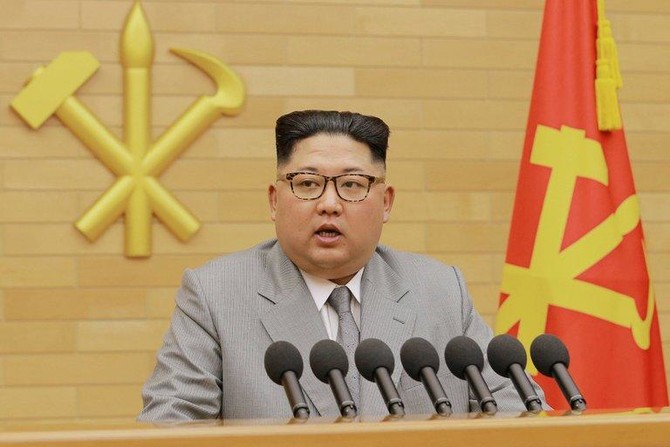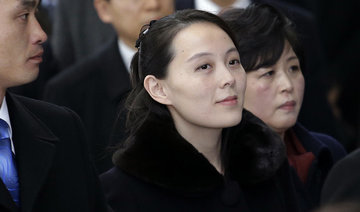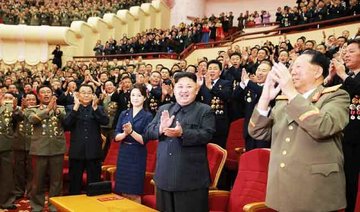SEOUL: A South Korean delegation met North Korean leader Kim Jong Un on Monday, a South Korean official said, after arriving in the North on a visit aimed at encouraging North Korea and the United States to talk.
Both North Korea and the United States have expressed a willingness to talk, but the long-held US position is that the North first give up its nuclear weapons program.
The North, which has vowed never to give up its nuclear deterrent against what it sees as US hostility, says it will not sit down to talks under preconditions.
Reclusive North Korea, which has made no secret of its pursuit of a nuclear-tipped missile capable of reaching the mainland United States in defiance of UN Security Council resolutions, is also concerned about joint US-South Korea military exercises, which it sees as preparation for war.
South Korean officials have said the drills will start next month as planned, after being postponed for the Winter Olympics held last month in South Korea.
The 10-member South Korean delegation, led by National Security Office head Chung Eui-yong, was greeted by North Korean officials after landing in Pyongyang, said Kim Eui-kyeom, a spokesman for South Korea’s presidential office.
The North Koreans at the airport included Ri Son Gwon, chairman of the Committee for the Peaceful Reunification of the Country, and Kim Yong Chol, who heads the United Front Department, the North Korean office responsible for handling inter-Korean affairs. Both visited South Korea last month during the Winter Olympics.
The South Korean delegation was later invited to join Kim Jong Un for dinner, the South Korean spokesman added.
The South Korean officials are the most senior officials from the South to meet Kim Jong Un since he took power in late 2011 following the death of his father, Kim Jong Il.
“We will deliver President Moon Jae-in’s wish to bring about denuclearization of the Korean peninsula and permanent peace by extending the goodwill and better inter-Korean relations created by the Pyeongchang Winter Olympics,” Chung said in South Korea before the delegation’s departure.
Chung’s team includes National Intelligence Service chief Suh Hoon and Vice Unification Minister Chun Hae-sung.
The government hopes the visit will create “a positive atmosphere,” Unification Ministry spokesman Baik Tae-hyun told a regular briefing.
Chung and Suh are due to fly to Washington later in the week to brief US officials on their discussions in the North.
Thawing relations between the Korean neighbors have prompted speculation about direct talks between Washington and Pyongyang after months of tension and exchanges of bellicose insults between US President Donald Trump and Kim Jong Un fueled fears of war.
North Korea has not carried out any weapons tests since late November, when it tested its largest intercontinental ballistic missile. Inter-Korean talks began after Kim Jong Un said in his New Year’s address that he wanted to engage the South.
North Korea later sent athletes to the Olympics, as well as a high-ranking delegation that included Kim’s sister, Kim Yo Jong.
Impoverished North Korea and the rich, democratic South are technically still at war because their 1950-53 conflict ended in a truce, not a peace treaty.
The North regularly threatens to destroy the South and its main ally, the United States, which stations 28,500 troops in the South, a legacy of the Korean War.
“Neither sanctions nor provocations nor threats can ever undermine our position of a nuclear weapons state,” the North’s Rodong Sinmun newspaper said recently.
“Hoping that the DPRK would abandon its nuclear programs is as foolish an act as trying to wish seas to get dried up,” it said, referring to itself by its official name, the Democratic People’s Republic of Korea.
South Koreans meet North Korean leader Kim for talks about talks
South Koreans meet North Korean leader Kim for talks about talks

US tariffs take aim everywhere, including uninhabited islands

The Australian territory in the sub-Antarctic Indian Ocean was slapped with 10 percent tariffs on all its exports, despite the icy archipelago having zero residents — other than many seals, penguins and other birds.
Strings of ocean specks around the globe, including Australia’s Cocos (Keeling) Islands and the Comoros off the coast of Africa, were likewise subjected to 10 percent new tariffs.
Another eye-catching inclusion in the tariffs list was Myanmar, which is digging out from an earthquake that left nearly 3,000 people dead, and whose exports to the United States will now face 44 percent in new levies.
Britain’s Falkland Islands — population 3,200 people and around one million penguins — got particular punishment.
The South Atlantic territory — mostly famous for a 1982 war fought by Britain to expel an Argentinian invasion — was walloped with tariffs of 41 percent on exports to the United States.
The Falklands’ would-be ruler Argentina only faces 10 percent new tariffs.
According to the Falklands Chamber of Commerce, the territory is ranked 173 in the world in terms of global exports, with only $306 million of products exported in 2019. This included $255 million in exports of mollusks and $30 million of frozen fish.
What the world said about Trump’s tariffs

Here are international reactions so far:
China
Beijing said it “firmly opposes” the new tariffs on its exports, and vowed “countermeasures to safeguard its own rights and interests.”
Trump unveiled particularly stinging tariffs of 34 percent on China, one of its largest trading partners, while a 10 percent base tariff on all countries also applies. That comes on top of a 20 percent rate imposed last month.
The tariffs “do not comply with international trade rules,” China’s Commerce Ministry said.
It urged Washington to “immediately cancel” them, warning they “endanger global economic development.”
European Union
The tariffs are a “major blow to the world economy,” warned EU chief Ursula von der Leyen.
“There seems to be no order in the disorder. No clear path through the complexity and chaos that is being created as all US trading partners are hit,” she said.
After the 20 percent tariffs on EU exports to the United States, she said Brussels was “preparing for further countermeasures” but added it was “not too late to address concerns through negotiations.”
Germany
German Chancellor Olaf Scholz slammed the tariffs as “fundamentally wrong” as Berlin warned that the European Union could retaliate by targeting American tech titans.
“This is an attack on a trade order that has created prosperity all over the globe, a trade order that is essentially the result of American efforts,” Scholz said.
Japan
Trade minister Yoji Muto said the 24 percent tariffs on Japanese exports to the United States were “extremely regrettable, and I have again strongly urged (Washington) not to apply them to Japan.”
Japan’s chief cabinet secretary Yoshimasa Hayashi told reporters the tariffs may contravene World Trade Organization rules and the pair’s trade treaty.
UK
UK Prime Minister Keir Starmer said “there would be an economic impact” from a 10 percent tariff imposed on British exports to the United States.
“Today, I will act in Britain’s interests with mine,” said Starmer, adding that trade negotiations would continue with Donald Trump’s administration and that “we will fight for the best deal for Britain.”
The UK will “remain calm, and committed” to sealing a trade deal with the United States which could help “mitigate” the tarriff rise, business minister Jonathan Reynolds said.
France
French Prime Minister Francois Bayrou said the hikes were a “catastrophe” all round.
“This decision is a catastrophe for the economic world,” Bayrou said. “It is an immense difficulty for Europe. I believe that it is also a catastrophe for the United States and for American citizens.”
Italy
Italian Prime Minister Giorgia Meloni criticized the new US tariffs on imports from the EU and urged a deal, warning a trade war would “inevitably weaken the West.”
“The introduction by the US of tariffs toward the EU is a measure that I consider wrong and that does not suit either party,” she said.
Canada
Prime Minister Mark Carney warned the tariffs will “fundamentally change the global trading system.”
“We are going to fight these tariffs with countermeasures. We are going to protect our workers,” he said.
Spain
Spanish Prime Minister Pedro Sanchez called the tariffs a “unilateral attack” against Europe.
This measure marks a return to “19th century protectionism, which in my opinion, is not an intelligent way to meet the challenges of the 21st century,” he said.
Australia
Prime Minister Anthony Albanese said Australia would not retaliate but said: “This is not the act of a friend.”
Australia, where one in four jobs depends on trade, charges nothing on US imports, Albanese said, calling the tariffs “unwarranted” and saying they undermine “our free and fair trading relationship.”
Brazil
Brazil’s Congress approved a so-called “Economic Reciprocity Law” allowing the executive to respond to the 10 percent tariffs on exports from Latin America’s biggest economy, which is the second-largest exporter of steel to the United States after Canada.
South Korea
“A global tariff war has become a reality,” said acting president Han Duck-soo following Trump’s 25 percent tariffs on imports from South Korea.
Han convened an emergency task force and vowed to mobilize “all government resources” to overcome the “trade crisis,” urging ministers to minimize the damage through aggressive negotiations with Washington.
Switzerland
After Switzerland was hit with 31 percent tariffs, President Karin Keller-Sutter said the government would quickly decide on the next steps.
“The country’s long-term economic interests are the priority. Respect for international law and free trade are fundamental,” she said.
Poland
“Friendship means partnership. Partnership means really and truly reciprocal tariffs,” said Prime Minister Donald Tusk.
Taiwan
The Taiwanese government found the 32 percent levy “highly unreasonable and deeply regretted it” said cabinet spokeswoman Michelle Lee.
She said Taiwan would “initiate serious negotiations with the United States.”
Thailand
Thai Prime Minister Paetongtarn Shinawatra said he had a “strong plan” on how to respond, believing that there remained room to negotiate.
Deputy Finance Minister Julapun Amornvivat said Thailand would “negotiate with understanding, not aggressive talk. But we have to talk which products they feel are unfair and we have to see whether we can adjust.”
India
India’s commerce ministry reacted cautiously, saying it is “carefully examining the implications of the various measures” after the US slapped a flat 26 percent on exports imposed on the fifth-largest economy .
It also said it was “studying the opportunities that may arise due to this new development,” a likely reference to regional competitors being hit harder.
Bangladesh
Bangladeshi textile industry leaders said the tariffs posed a “massive blow” to the world’s second-largest garment manufacturer, which accounts for some 80 percent of the South Asian nation’s exports.
“Buyers will go to other cost-competitive markets — this is going to be a massive blow for our industry,” said Rakibul Alam Chowdhury, chairman of RDM Group, a major manufacturer with an estimated $25 million turnover. “We will lose buyers.”
South Africa
The new 30 percent tariffs on South African imports are a concern and underscore the urgent need for a new bilateral trade agreement, President Cyril Ramaphosa said.
“The tariffs affirm the urgency to negotiate a new bilateral and mutually beneficial trade agreement with the US as an essential step to secure long-term trade certainty,” he said. The United States is South Africa’s second-biggest trading partner.
China arrests three Filipinos suspected of spying

- Announcement comes as the two countries continue to confront each other over disputed territory in the South China Sea
- At least five Chinese nationals were arrested on suspicion of espionage in January and another two in February by Philippine authorities
BEIJING: China on Thursday said it had “destroyed” an intelligence network set up by the Philippine espionage agency and arrested three spies from the country.
The announcement comes as the two countries continue to confront each other over disputed territory in the South China Sea and tensions mount over the Philippines’ security ties with ally the United States.
At least five Chinese nationals were arrested on suspicion of espionage in January and another two in February by Philippine authorities.
And the latest arrests in China come two days after Beijing’s embassy in Manila issued a travel warning to its citizens about frequent “harassment” from Philippine law enforcement agencies.
On Thursday, state broadcaster CCTV reported that authorities had identified one of the suspected spies as a Philippine national who had lived and worked in China long-term and had been found conducting espionage near military facilities.
The CCTV report included a video of his arrest and what appeared to be a recorded confession.
He was recruited by Philippine intelligence services to “take advantage of his long-term residence in China to conduct espionage activities in China and collect sensitive information, especially on military deployment,” state media said.
He came close to military facilities multiple times and “conducted close observation and secret photography,” CCTV added.
The three individuals had been recruited by the same Philippine spy since 2021 and received regular payment for their work, CCTV said.
They were also tasked with “assisting the Philippine spy intelligence agency in selecting and developing personnel, and expanding its intelligence network in China.”
They had provided “a large amount of military-related and confidential video materials” to Philippine agents, “causing serious harm to China’s national security and interests,” CCTV quoted a Chinese national security officer as saying.
Manila’s National Security Council spokesman Jonathan Malaya told AFP the country’s foreign ministry was “currently confirming these reports and the involvement of any Philippine national, if any.”
“We have no further comment as of this time until we are able to verify these new reports,” he added.
Asked about the charges, Beijing’s foreign ministry said it would “handle the cases in accordance with the law and will also safeguard the legitimate rights and interests of the relevant personnel.”
But spokesman Guo Jiakun also accused Manila of having “fabricated several so-called Chinese espionage cases.”
“China urges the Philippines to stop chasing shadows and pinning labels on people,” Guo said.
UK police arrest two men over alleged Hezbollah links

- Police said the investigation related to the Iran-backed Lebanese movement Hezbollah which Britain outlawed in 2019
LONDON: British counter-terrorism police said on Thursday they had arrested two men accused of being linked to the banned group Hezbollah, saying their investigation involved alleged activity both overseas and in Britain.
Detectives from London’s Counter Terrorism Command (CTC) arrested a 39-year-old man in north London on suspicion of being a member of a proscribed group, preparing acts of terrorism and being involved in funding for the purposed of terrorism.
A second man, 35, was arrested in west London on suspicion of being a member of a banned organization.
“Our investigation remains ongoing, but I hope that these arrests show we will take robust action against anyone here whom we suspect as being involved in terrorist activity regardless of whether their activity is focused here in the UK or elsewhere,” said commander Dominic Murphy, head of the CTC.
Police said the investigation related to the Iran-backed Lebanese movement Hezbollah which Britain outlawed in 2019 when it classified it as a terrorist group. There was no immediate threat to the public, they said.
The two men were released on police bail until mid-July.
Hungary to withdraw from ICC as Netanyahu arrives despite warrant

- Hungary’s government, led by right-wing populist Orbán, extended the invitation to Netanyahu in November after the ICC, based in the Hague, Netherlands, issued the warrant accusing him of crimes against humanity
BUDAPEST: Hungary said Thursday it will begin the procedure of withdrawing from the world’s only permanent global tribunal for war crimes and genocide.
“Hungary will withdraw from the International Criminal Court,” Gergely Gulyás, who is Prime Minister Viktor Orbán chief of staff wrote in a brief statement. “The government will initiate the withdrawal procedure on Thursday, in accordance with the constitutional and international legal framework.”
The announcement came as Israeli Prime Minister Benjamin Netanyahu arrived in the Hungarian capital, Budapest, despite an international arrest warrant against him over his conduct of the war in the Gaza Strip.
Hungary’s government, led by right-wing populist Orbán, extended the invitation to Netanyahu in November after the ICC, based in the Hague, Netherlands, issued the warrant accusing him of crimes against humanity.
Orbán, a close Netanyahu ally, has called the arrest warrant “outrageously impudent” and “cynical.” Member countries of the ICC, such as Hungary, are required to detain suspects facing a warrant if they set foot on their soil, but the court has no way to enforce that and relies on states to comply with its rulings.
















